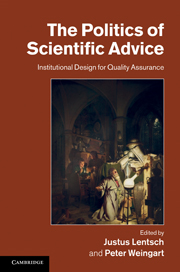Book contents
- Frontmatter
- Contents
- List of figures
- List of tables
- Acknowledgements
- Biographical notes
- Part I Methodological issues: quality control and assurance in scientific policy advice
- 1 Introduction: the quest for quality as a challenge to scientific policy advice: an overdue debate?
- 2 Quality control and peer review in advisory science
- 3 Reconciling representation with reality: unitisation as an example for science and public policy
- 4 Looking for quality in all the wrong places, or: the technological origins of quality in scientific policy advice
- Part II Collegial science advisory bodies
- Part III Collegial science policy advisory bodies
- Part IV Research-based advisory organisations
- Part V Academies of science
- Index
- References
2 - Quality control and peer review in advisory science
Published online by Cambridge University Press: 25 October 2011
- Frontmatter
- Contents
- List of figures
- List of tables
- Acknowledgements
- Biographical notes
- Part I Methodological issues: quality control and assurance in scientific policy advice
- 1 Introduction: the quest for quality as a challenge to scientific policy advice: an overdue debate?
- 2 Quality control and peer review in advisory science
- 3 Reconciling representation with reality: unitisation as an example for science and public policy
- 4 Looking for quality in all the wrong places, or: the technological origins of quality in scientific policy advice
- Part II Collegial science advisory bodies
- Part III Collegial science policy advisory bodies
- Part IV Research-based advisory organisations
- Part V Academies of science
- Index
- References
Summary
For the most part of a century, two almost axiomatic beliefs guided democratic societies in their attempts to incorporate science into public policy. The first is that good scientific knowledge is the best possible foundation for public decisions across ever-widening policy domains. The second is that the best way to secure scientific inputs of high quality is to allow scientists the freedom to monitor and criticise each other's contributions, through procedures conventionally grouped under the heading of peer review. In this way, science comes closest to an ideal described as ‘speaking truth to power’. Scientists, in this view, should independently establish the facts of the matter as well as they can be established; politicians can then decide how to act upon those facts, taking other social values into consideration. We can think of this as the linearity-autonomy model of science for policy. In it, scientific fact-finding is seen as standing apart from and prior to politics, as decisions move in linear fashion from facts to values. Science is entitled to establish the quality and integrity of its findings on its own terms before political judgements come into play. Deviation from this ideal threatens to convert science into an instrument of politics. With loss of autonomy, science, it is thought, cannot deliver objective information about the functioning of nature or society.
- Type
- Chapter
- Information
- The Politics of Scientific AdviceInstitutional Design for Quality Assurance, pp. 19 - 35Publisher: Cambridge University PressPrint publication year: 2011
References
- 31
- Cited by

